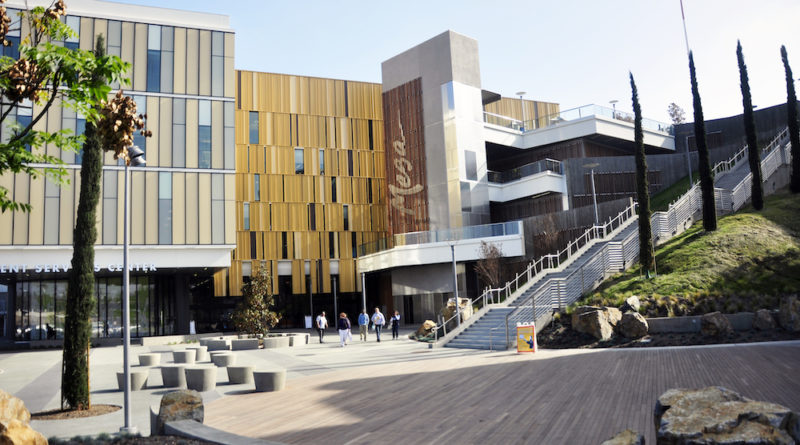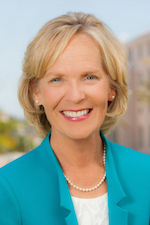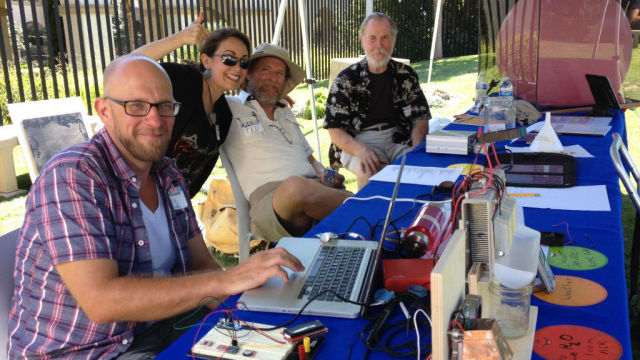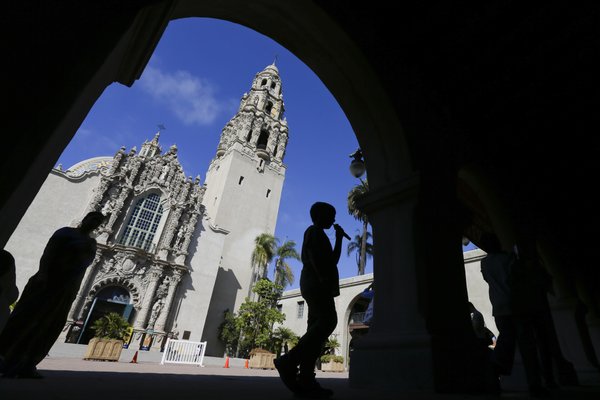Daily Business Report: Friday, Oct. 14, 2022
Despite progress, California community colleges
won’t reach aspirational goals of the governor
By Mikhail Zinshteyn | CalMatters
In 2017, barely a half-year into his tenure as chancellor of the country’s largest system of higher education, Eloy Ortiz Oakley threw down the gauntlet. Under his leadership, the California Community Colleges unveiled a series of unprecedented academic goals dubbed the Vision for Success.
If met, the achievements would catapult California’s moribund community college system to new heights, leading to thousands more students annually earning degrees, certificates and transferring to universities.
The deadline to meet most of those goals came and went last month.
The verdict? The system has virtually no shot of reaching its most audacious academic goals of narrowing by 40% the graduation rate gap among its Black, Latino and white students in five years. Nor is the system on track to narrow the graduation-rate gaps across regions, such as between the Bay Area and the poorer Inland Empire.
While the number of students graduating after three years has inched upward for all regions — and almost all demographic groups — the regions and groups that were already completing degrees and certificates at higher levels have continued to grow their rates. With even progress across the board, the groups already behind can’t catch up unless community colleges graduate them at faster rates. For this reason, it’s unlikely that the graduation rates will narrow to remove the so-called “equity gap” among regions and demographic groups.
Top Photo: San Diego Mesa College
Sports betting proponents admit likely defeat
The backers of two dueling November ballot measures to legalize sports betting in California aren’t exactly folding — but they acknowledged in Tuesday panels at a Las Vegas gambling conventionthat they aren’t likely to end up with winning hands even after campaigns on both sides of the initiatives raised more than $440 million. The news comes less than a week after a UC Berkeley and Los Angeles Times poll found that both Propositions 26 and 27 were significantly underwater with likely voters, with just 31percent in favor of allowing Native American casinos and horse race tracks to offer in-person sports betting and merely 27percent in support of authorizing online sports gambling.
—CalMatters
Seven-story, 175-unit apartment
project planned for Normal Heights
INI Greenfield MC is setting the groundwork for construction of the Mars Project, a seven-story, 175-unit, multi-family, mixed use development project in Normal Heights. The first stage will take about four months, with actual construction beginning in early 2023. Units will be ready for occupancy in 2024. According to INI Greenfield MC, the project endeavors to move development forward in Normal Heights, adding modern housing options to the existing, dated housing inventory.
The development will not only offer modern, efficient places to live, but will bring commerce to local businesses, and elevate Normal Heights alongside North Park, South Park, University Heights, Hillcrest, East Village, Golden Hill and Mission Hills as a highly desirable place to live, according to the developer.
County top executive Helen Robbins-Meyer to retire
After 25 years of dedicated leadership at the County of San Diego, Chief Administrative Officer Helen Robbins-Meyer announced Wednesday she will retire and welcome a new generation to guide the county into the future.
The exact date of her departure was left open to allow the county time to conduct a search for her successor and ensure a smooth transition. The process is expected to run into 2023.
Robbins-Meyer began at the county as a deputy chief administrative officer following a career in private industry. She rose to assistant CAO, then took over the top executive position in 2012.
She informed the Board of Supervisors during the closed session after their Wednesday meeting of her intention to end her time at the county.
Robbins-Meyer oversees an annual budget of over $7 billion, more than 40 departments that provide a diverse variety of services, and a workforce of 18,000 employees.
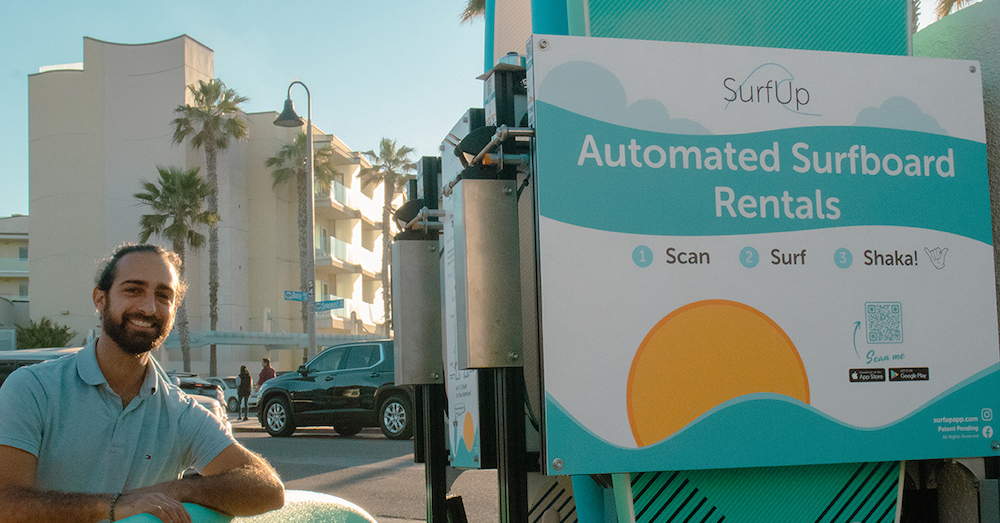
Surfboard rentals at the beach — by app
By Katherine Connor
Surfing in San Diego just got a whole lot easier, thanks to a team of UC San Diego alumni bringing app-based, accessible board rental right where it’s needed. The SurfUp App functions much like Bird scooters or Citi Bike— several boards are available in convenient locations along the coast, with a customer simply renting one for as long as needed with the app. The renter checks the board back into the surf rack when done—no rental car, surfboard car rack, or day or week-long rental needed.
“What we really aim to do with SurfUp is minimize the barriers to entry to make it more accessible and easier for somebody who wants to try out surfing,” said Chris Hissom, SurfUp co-founder and CEO, who earned bachelor’s degrees in physiology and neuroscience from UC San Diego, as well as his MBA from the campus Rady School of Management. The startup currently has four racks actively renting out boards: three in Pacific Beach, and one in Imperial Beach, all just a short walk from the waves. For now, the concept is geared toward beginners—vacationers, or locals simply wanting to give it a go—with larger boards for newbies available in each quiver. Ultimately, Hissom envisions an expanded offering where even experienced surfers could rent a board to try out different sizes, shapes and makers for a session to find what they like. The concept will be expanded to paddle boards and other water-based activities as well.
City of San Diego’s ‘Tech on the Go’ classes
help residents improve computer skills
Standing in front of the Malcolm X/Valencia Park Library on Thursday, City Council President Pro Tem Monica Montgomery Steppe joined the San Diego Futures Foundation to officially launch Tech on the Go – a new digital literacy program offering free in-person classes for any San Diegan who wants to learn how to use a computer and better navigate the internet.
A partnership between the City of San Diego and the San Diego Futures Foundation, Tech on the Go instructors visit libraries, recreation centers and community centers to provide the classes to improve computer and online literacy. Classes are open to people of all skill levels and laptops are provided during the class for those who need one.
Classes are currently being offered at seven locations:
• Central Library, 330 Park Blvd.
• Logan Heights Library, 567 S. 28th St.
• Park de la Cruz Recreation Center, 3911 Landis St.
• San Ysidro Library, 4235 Beyer Blvd.
• Sherman Heights Community Center, 2258 Island Ave.
• Skyline Library, 7900 Paradise Valley Road.
• Valencia Park/Malcolm X Library, 5148 Market St.
Mindgruve selected as agency
of record for First Horizon Bank
San Diego-based Mindgruve, one of the fastest-growing digital marketing agencies in the U.S., has been selected as the Agency of Record for First Horizon Bank, one of the top 10 banks in the U.S. with approximately 417 locations across the southeast. First Horizon Bank partnered with Mindgruve’s team of strategists, creatives, engineers, media experts, and data scientists to lead creative, web presence, digital media, analytics, and public relations.
Mindgruve, a global, independent digital agency, has helped brands drive business growth for more than 20 years.
Pacsun opens new store in Fashion Valley
Pacsun announced its newest location and redesigned retail space at the Fashion Valley in San Diego. The latest storefront in Pacsun’s home base in South California features a modernist look indicative of the new design formula and layout for the youth retailer.
Pacsun at Fashion Valley is the first location to showcase Pacsun’s new brick-and-mortar vision. The 4,277-square-foot space located on the upper level between Nike and Soleniverse, greets guests with an open air façade and sizable windows displaying Pacsun’s current styles and collections.
Annual aqueduct work starts Oct. 16
Sections of the regional aqueducts will be shut down over the next six months for maintenance projects to ensure a safe and reliable water supply for the region. The San Diego County Water Authority and its member agencies are coordinating on the annual “shutdown season” to minimize impacts to residents and businesses, who are not expected to face service disruptions. Starting Oct. 16, a portion of Pipeline 5 will be out of service for 10 days to accommodate annual maintenance on the entire untreated water system and to prepare for rehabilitation of other sections of the pipeline.
SOCi selected as marketing platform of record
San Diego-based SOCi Inc. has been selected by Express Employmen Professionals as its multi-location marketing platform of record. Through SOCi Social, SOCi Reviews and most recently, SOCi Listings, the new agreements will allow Express franchisees to better manage their marketing efforts in an efficient, time-saving manner.
“Our ultimate goal at SOCi is to see our customers meet their marketing and business goals,” said Afif Khoury, CEO of SOCi. “Their success is our success, so I’m thrilled Express Employment Professionals is seeing a real impact as a result of using our platform.”
Blood test may speed Alzheimer’s trial enrollment
The Alzheimer’s Therapeutic Research Institute (ATRI), part of the University of Southern California Keck School of Medicine in San Diego, has launched AlzMatch, a new research study where selected volunteers have their blood tested to determine potential eligibility for Alzheimer’s disease trials. The AlzMatch Study seeks to determine whether a single blood test, collected at Quest Diagnostics laboratories across the country, can help speed clinical trial enrollment for anti-amyloid treatments by identifying individuals who have an increased likelihood of having brain amyloid. Brain amyloid is a protein that builds up in people who may go on to have memory problems because of Alzheimer’s disease.
$3 million grant will expand efforts to
improve education of English learners
Two Cal State San Marcos education professors have received a five-year, $3 million grant from the U.S. Department of Education that will allow them to continue and expand their work improving the instruction of English learners in the region.
The grant was awarded to Ana Hernandez and Annette Daoud, both professors in the School of Education, through the National Professional Development (NPD) program. That program is administered by the Department of Education’s Office of English Language Acquisition, which provides national leadership to ensure that English learners and immigrant students attain English proficiency and achieve academic success. Of the 144 applications for NPD grants in the 2022 cycle, only 44 received funding.
MiraCosta College awarded $3 million
grant for Latinx students
MiraCosta College has been awarded a $3 million federal grant that will increase academic and social supports for Latinx students and better connect their education as a pathway to high-demand careers. Latinx is a gender-neutral term to refer to a Latino/Latina person.
The MiraCosta College Foundation will match a portion of the annual grant funds to create a longer-lasting endowment to ensure the grant will have impact beyond its five-year term. “More than 40 percent of MiraCosta College’s 20,000 students are Latinx, and 53.8 percent are economically disadvantaged. Studies show that Latinx students are less likely to succeed in their classes or complete the courses needed to earn an associate degree,” said Freddy Ramirez, Title V project director and dean of admissions and student support.
The MiraCosta College Foundation will match a portion of the annual grant funds to create a longer-lasting endowment to ensure the grant will have impact beyond its five-year term. “More than 40 percent of MiraCosta College’s 20,000 students are Latinx, and 53.8 percent are economically disadvantaged. Studies show that Latinx students are less likely to succeed in their classes or complete the courses needed to earn an associate degree,” said Freddy Ramirez, Title V project director and dean of admissions and student support.

